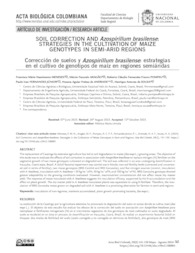Soil correction and Azospirillum brasilense: strategies in the cultivation of maize genotypes in semi-arid regions.
Soil correction and Azospirillum brasilense: strategies in the cultivation of maize genotypes in semi-arid regions.
Author(s): MENESES, F. M. N.; ARAGÃO, M. F.; POMPEU, R. C. F. F.; FERNANDES JUNIOR, P. I.; ANDRADE, H. A. F. de; SOUZA, H. A. de
Summary: Abstract: The replacement of Caatinga by extensive agriculture has led to soil degradation in maize (Zea mays L.) growing areas. The objective of this study was to evaluate the effects of soil correction in association with Azospirillum brasiliense to replace nitrogen (N) fertilizer on the vegetative growth of two maize genotypes cultivated on degraded soil. The soil was collected in an area undergoing desertification in Irauçuba, Ceará state, Brazil. A 2x2x5 factorial experiment was carried out in blocks: two soil fertility levels (corrected and uncorrected soil in terms of fertility), two maize genotypes (BRS Caimbé and BRS Gorutuba), and five nitrogen sources (control, inoculation with A. brasilense, inoculation with A. brasilense + 50 kg ha-1 of N, 50 kg ha-1 of N,and 100 kg ha-1 of N). BRS Gorutuba genotype showed greater adaptability to the growing conditions evaluated. However, macronutrient concentration did not affect maize dry matter yield. The response of maize inoculated with A. brasiliense suggests the inoculation efficacy, supported by the N accumulation and the effect on plant growth. The dry matter yield in A. brasilense inoculated plants was equivalent to using N fertilizer. Therefore, the inoculation of BRS Gorutuba maize grown on degraded soil with A. brasilense is a promising alternative for farmers in semi-arid regions. Resumen: The replacement of Caatinga by extensive agriculture has led to soil degradation in maize (Zea mays L.) growing areas. The objective of this study was to evaluate the effects of soil correction in association with Azospirillum brasiliense to replace nitrogen (N) fertilizer on the vegetative growth of two maize genotypes cultivated on degraded soil. The soil was collected in an area undergoing desertification in Irauçuba, Ceará state, Brazil. A 2x2x5 factorial experiment was carried out in blocks: two soil fertility levels (corrected and uncorrected soil in terms of fertility), two maize genotypes (BRS Caimbé and BRS Gorutuba), and five nitrogen sources (control, inoculation with A. brasilense, inoculation with A. brasilense + 50 kg ha-1 of N, 50 kg ha-1 of N, and 100 kg ha-1 of N). BRS Gorutuba genotype showed greater adaptability to the growing conditions evaluated. However, macronutrient concentration did not affect maize dry matter yield. The response of maize inoculated with A. brasiliense suggests the inoculation efficacy, supported by the N accumulation and the effect on plant growth. The dry matter yield in A. brasilense inoculated plants was equivalent to using N fertilizer. Therefore, the inoculation of BRS Gorutuba maize grown on degraded soil with A. brasilense is a promising alternative for farmers in semi-arid regions.
Publication year: 2024
Types of publication: Journal article
Unit: Embrapa Goats & Sheep
Keywords: Azospirillum brasilense, BRS Gorotuba, Brazil, Caatinga, Correção do solo, Desertification, Desertificação, Dry matter, Fertilizante Nitrogenado, Inoculante, Inoculation of non-legumes, Macroelemento, Macronutrients, Milho, Nitrogen fertilizers, Nutrients accumulated, Nutrição Vegetal, Plant growth, Plant growth promoting bacteria, Plant growth-promoting rhizobacteria, Plant nutrition, Semiarid soils, Soil correction, Soil inoculation, Soil microorganisms, Zea Mays
Observation
Some of Embrapa's publications are published as ePub files. To read them, use or download one of the following free software options to your computer or mobile device. Android: Google Play Books; IOS: iBooks; Windows and Linux: Calibre.
Access other publications
Access the Agricultural Research Database (BDPA) to consult Embrapa's full library collection and records.
Visit Embrapa Bookstore to purchase books and other publications sold by Embrapa.

